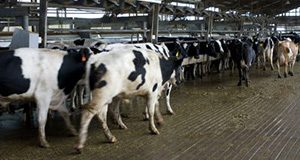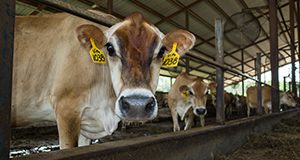El estrés térmico ocurre cuando el calor producido por los procesos biológicos y el calor absorbido del ambiente excede la capacidad de la vaca para perder calor. This 2-page document is the Spanish version of AN356, Recognizing Heat Stress in Dairy Cows. Written by Izabella Toledo and Geoffrey Dahl, and published by the UF/IFAS Department of Animal Sciences, October 2019.
http://edis.ifas.ufl.edu/an358
Tag: Heat Stress
How Are Cows Cooled on Dairy Farms in Florida?
While hot and humid conditions cause grief for dairy producers, additional impacts of heat and humidity on the dairy cow are sometimes overlooked. These conditions and their associated losses in productivity pose a growing concern to dairy producers, as more frequent and severe fluctuations in temperature, precipitation, and droughts are predicted to occur in the United States. This new 4-page document discusses heat stress in the dairy industry, the Florida dairy heat stress abatement survey, and heat stress abatement for lactating cows, dry cows, and dairy calves. Written by Bethany Dado-Senn, Geoffrey E. Dahl, and Jimena Laporta, and published by the UF/IFAS Department of Animal Sciences, April 2019.
http://edis.ifas.ufl.edu/an355
Economic Feasibility of Cooling Dry Cows: Findings and Spreadsheet
The negative effects of heat stress in lactating cows are well known, but only recent studies have explored those effects along with the full benefits of cooling dry cows. Recent work at the University of Florida has demonstrated the benefits of dry cow cooling on calf performance and cow health in the next lactation. This 5-page fact sheet discusses the economic losses from milk production due to heat stress, investment, utilities, maintenance, and feasibility analysis. Written by Fernanda Ferreira, Geoffrey Dahl, and Albert De Vries, and published by the UF/IFAS Department of Animal Sciences, March 2018.
http://edis.ifas.ufl.edu/an342
Hydration in Hot Working Environments (FCS80018/FY1325)
 Are you at risk for heat-related illnesses? Summertime isn’t the only time you should be concerned about drinking enough water to stay hydrated. Workers in construction, landscaping, laundry, factory, farm, or restaurant settings, among others, often are faced with hot working environments year-round. These conditions can increase the risk for developing heat-related illnesses, so staying well hydrated is very important. This 3-page fact sheet was written by Jeanine Beatty and Gail P. A. Kauwell, and published by the UF Department of Family Youth and Community Sciences, March 2012.
Are you at risk for heat-related illnesses? Summertime isn’t the only time you should be concerned about drinking enough water to stay hydrated. Workers in construction, landscaping, laundry, factory, farm, or restaurant settings, among others, often are faced with hot working environments year-round. These conditions can increase the risk for developing heat-related illnesses, so staying well hydrated is very important. This 3-page fact sheet was written by Jeanine Beatty and Gail P. A. Kauwell, and published by the UF Department of Family Youth and Community Sciences, March 2012.
http://edis.ifas.ufl.edu/fy1325

